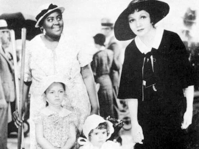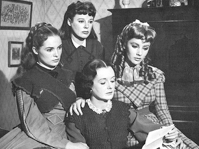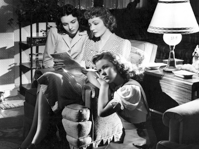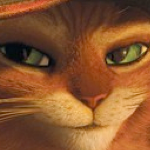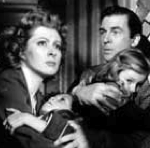
For Mother’s Day, a myriad of movie reviewers rank the top ten mothers in movie with Joan Crawford from Mommy Dearest and Sarah Conner from The Terminator making the lists. Given the holiday is meant to celebrate the best qualities of motherhood, I thought perhaps an idealistic look a bit further backward might be a good idea. With that in mind, here are some of the actresses and films that embody the role in inspiring and admirable ways. Some women represent the more traditional understanding of motherhood, others show a more expanded view…Some of the movies are well known, some might be new to you, but all are worthy of repeated viewing.
Let’s start with Claudette Colbert, the Oscar winning actress from Frank Capra’s It Happened One Night who has been in several great movies with important maternal roles. My favorite is 1944’s Since You Went Away. Nominated for 8 Oscars including Best Picture and Best Actress for Colbert’s work, it is one of the best examples of World War II propaganda films made in Hollywood representing the home front. Colbert as Mrs. Anne Hilton keeps the home fires burning and watches after her two teenaged girls while her husband is away at war. Her character portrays motherhood in wartime in a multidimensional way while still keeping the movie optimistic. As usual the themes of sacrifice and strength in the face of uncertainty and adversity are played up, but there is a warmth, depth, and sophistication to this film that places it at the top of the genre. A quick mention should be made of the great character actors Monte Woolley and Agnes Moorehead, both classically trained stage actors bringing their usual quirky star quality to this film.
Claudette Colbert also plays a mother in the 1934 groundbreaking melodrama Imitation of Life, known for being the first Hollywood film that features a black actress in a meaningful multilayered role. Louise Beavers plays the character of Delilah Jones, a single mother, who becomes the first black entrepreneur, male or female, to be represented in white Hollywood. Colbert plays Bea Pullman, a widow barely able to afford raising her daughter. She befriends Delilah Jones, who has her own daughter, as well as a pancake recipe that proves valuable when Bea finds a way to market the pancakes, making them both rich and famous. A major part of the movie deals with Delilah’s daughter, who, ashamed of her heritage, tries to pass for white, and treats her mother badly in the process. Many believe Louise Beavers should have won an Oscar for her portrayal, but she wasn’t even nominated. She did see her close friend Hattie McDaniel win the first Oscar for a woman of color for 1939’s Gone With the Wind…
Controversy surrounded Imitation of Life at the time, but has since been recognized as an important milestone in studio films. Being a melodrama, it doesn’t have the happy sparkle of some other selections, but it is optimistic nonetheless for its groundbreaking realistic portrayal of black women and single mothers in the 30s. Louise Beavers, interestingly enough, also plays Jackie Robinson’s mother in a film that represents another important milestone for blacks in America, 1950’s The Jackie Robinson Story, with the starring role played by the famed baseball player himself.
The luminous Greer Garson won the Best Actress Oscar playing the title role in another World War II classic, 1943’s Mrs. Miniver, which also won Best Director and Best Picture that year. Not a laugh riot by any means, this movie themes are sacrifice and strength of character. The Minivers are a middle class English family dealing with the first months of the war. They have two small children and an older son who falls in love then goes into the RAF. Tragedy and hardship ensues, but Mrs. Miniver shows women are made of steel when called to be, and can still be gentle loving mothers and wives. Known as one of the best home front movies made during the war, it made Garson a superstar, and will stay with you long after the credits run.
Greer Garson played a lot of strong female leads, especially in the early 1940s. Another recommended movie featuring Garson in a maternal role is 1941’s non-fictional story, Blossoms in the Dust, where she portrays Edna Gladney. Her husband is played by the same actor who plays opposite her in Mrs. Miniver, Walter Pidgeon. The Gladneys have a son who is killed as a child, which leads Mrs. Gladney to to inadvertently discover how the law treats children without parents. She opens a home for foundlings and orphans and ultimately fights the Texas legislature to remove the stigma of illegitimacy from birth records, while advocating for homeless children. This movie shows beautifully and with a non-fiction story that the maternal instinct can extend far beyond blood relations.
Actress Mary Astor is in hundreds of movies, including the girl gone bad Brigid O’Shaughnessy in the 1941 detective classic, The Maltese Falcon, and she won an Oscar for supporting actress in 1941’s The Great Lie. Both of these movies were made when Astor was at the height of her fame, impressive because The Great Lie was her 96th feature! Astor plays two of the best loved, most positive portrayals of mothers in classic film, Mrs. Anna Smith in Vincente Minnelli’s perennial favorite Meet Me in St. Louis, and Marmee in the gorgeous technicolor 1949 version of Little Women with Elizabeth Taylor, June Allyson and Margaret O’Brien. Most fans of classic movies have seen both of these films at least once, but the next time, be it for the first or the 100th, pay closer attention to her acting. She is has an understated subtlety that serves both characters well.
Finally, the talented character actress and part of the Barrymore acting empire, Ethel Barrymore, plays two very different maternal roles in 1947’s The Farmer’s Daughter and 1945’s The Spiral Staircase. In The Farmer’s Daughter she plays the mother of congressman Glenn Morley (Joseph Cotton). The story centers on charming Swedish-American farmer’s daughter Katie Holstrom, (Loretta Young) who is more politically savvy than anyone expects, and through a strange series of circumstances, Katie is thrust into politics. The character of Katie Holstrom is a strong and positive female role model especially for the time, and Ethel Barrymore, as the powerful political family matriarch, offers sage advice and an open mind in a very memorable supporting role.
In The Spiral Staircase, Barrymore is seen as the terminal invalid Mrs. Warren, being cared for by the beautiful but mute Helen. (Dorothy McGuire, in one of her earliest films). Her two sons also live in the Warren household, and when someone starts killing women with “afflictions” in the neighborhood, Mrs. Warren begs Helen to leave for her safety. In this movie, unconditional love, sacrifice, and mother child relationships, both with blood ties and without, both healthy and unhealthy, are the main themes. It’s also a good old fashioned Hitchcockian suspense thriller, so there might be a scream or two in it for you or your mom. The Spiral Staircase made Dorothy McGuire a much bigger star, and Ethel Barrymore was nominated for a Best Supporting Actress Oscar for her role.
There are many more classics with positive portrayals of mothers you can find playing on TCM or through your local movie supplier, but this list has some of the best actresses of any generation playing some superbly written and multidimensional characters that encompass much of the beauties and strengths we think of when we consider the best traits of motherhood. These characters give us something to aspire to and identify with at the same time. That’s what the best movies and the best moms do, too.
Recommended Mother’s Day classics:
Imitation of Life (1934)
Mrs. Miniver (1942)
Blossoms in the Dust (1941)
Meet Me in St. Louis (1944)
Little Women (1949)
Since You Went Away (1944)
The Farmer’s Daughter (1947)
The Spiral Staircase (1945)
diamonds: The cinematography in Mrs. Miniver, and the gorgeous graceful Ms. Greer Garson. She is luminous in everything she does.
rubies: The scene in Imitation of Life where Louise Beavers should have been nominated for the Oscar. When you see it, you’ll know.
pearls: The speech Ethel Barrymore gives in The Farmer’s Daughter, the scene in Little Women when Mary Astor sees her Christmas presents under the tree.


